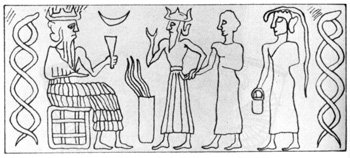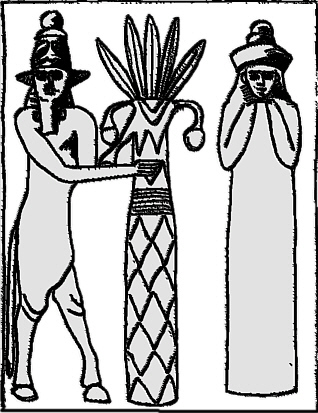I have been doing a lot more research lately on the issue of religion, its beginnings, as well as civilizations, namely the oldest known culture of Sumer. I have posted some other findings on the relationship between Yahweh and Satan, and the indication, according to the Sumerian texts that they were brothers. It is also interesting to note that most of the initial creation stories, and flood stories, are not unique to the Jews but are in fact a rip off of the Sumerian texts - which predate any other civilization.
As we all know, the "New Testament" does not contain the Jewish name of "God" or Yahweh. Jesus indicated that the scribes and religious leaders of the day did not know his father nor worshipped him, and that his father required mercy and not sacrifice. So who were the Jews worshipping the entire time? Who was Jesus implying was his "father"?
According to Sumerian texts Enki (Satan) created man and animals and his brother Enlil (jehovah) created the earth and sky. A rift came between them (much like the parable of Cain and Able / Esau and Jacob), and although Satan was the eldest of the brothers (their father was An chief Sumer god), Yahwehs mother held a higher rank (Yahweh and Satan, according to Sumer texts had different mothers), because of this Yahweh was given precedence in the Pantheon of Gods.
Eventually Yahweh would rule over both Earth and its creation. Each brother was considered an immortal, therefore if you wanted to hurt the other, you would not fight each other as it would make no sense, rather it would make more sense that you attack the objects of affection or creation of each respective brother. For this reason Jehovah tells Adam and Eve that they will work hard to cultivate the land (thus Jehovah makes life miserable for man by withdrawing his aid from Earth, which he made). He also instructs future generations that they should burn animal sacrifices, and that the odor is sweet to his nose. Hmmmm. Could it be that Jehovah purposely desired to hurt his older brother Satan an in indirect way by advising men to destroy the very creatures that his brother created?
Finally, Jehovah forbidded the people from exploring the occult or afterlife. Why? The Bible confirms that the spirit survives death when Saul had Samuels spirit invoked by a witch. Why would Jehovah not want people to know of an afterlife or look into the dead?
Could it be that he wants to control men to some degree and purposely tries to limit mans "knowledge" (sounds a bit like the test in the garden - Sumer texts say that Satan gave "knowledge" to the "first humans" as the Gods were using humans as slaves) on this world, so that humans are obedient only to him (Jehovah)? Did Satan, knowing he was bumped down in the pantheon hierarchy, take the next step and create another world beyond the grasp of his brother (Yahweh) were men would go after they died and truely be happy? Is this world we live in a failed attempt at the life that Satan wanted for his creation, and thus a first step into a transition? It would seem so, especially when Satan in Genesis tells Eve that she WOULD NOT DIE and that they would both be like gods knowing good and bad.
If this is the case then who was Jesus addressing when he said that the Pharisees were from their father, the father of the ORIGINAL lie? Could Jehovah have been the father of the lie by telling men that they would die in the DAY of eating of the fruit - trying to persuade the first humans NOT to take the "knowledge" offered to them by Satan by threatening them with death? No doubt the bible has been translated to fit the religious mindset of the day. Names may have been inserted/deleted (Jehovah /Satan) and stories may have been altered to paint a new picture on who was good and who was bad, when in actuality it may not have originally been the case as many of the Sumerian texts illustrate.
If you look at the OT records it is obvious that Jehovah had contempt for the Jews, and that he was a piss poor God. After all why would he forbid the entering of Moses into the promised land for a slip up of words? Also, the sumerian glyphs depict Jehovah in a bull form, and Enki (Satan) with the caduceus. Hmmm. Moses and Aaron make a golden calf... and later when the Jews are bit by snakes sent by Jehovah, Moses erects a copper serpent for the people to look at to be saved (shouldn't this have been idol worship)? Does Yahweh not have the means of medicine and extension of life and therefore the symbol was made to ask for Enki's (Satan's) assistance?
Very interesting similarities.

